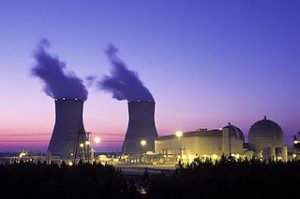Refusing to backtrack from a decision earlier this year, state regulators on Tuesday rejected a proposal by Gulf Power Co. to pass along costs to customers for a potential nuclear-power plant site in Escambia County.
Gulf wanted the Florida Public Service Commission to approve a relatively small increase in base rates to help cover costs related to the 4,000-acre site. Commissioners turned down the idea in February as part of a broader rate case, but Gulf made a somewhat-unusual request to reconsider the decision.
In again rejecting the proposal, commissioners sided with the state’s Office of Public Counsel, which represents consumers, and two business groups that often tangle with utilities about electricity costs. Opponents pointed, in part, to another Gulf property in Caryville that has long been in the rate base but has not been developed for a power plant.
“It would be bad public policy (to approve Gulf’s request), and it would go against the record evidence we have before us,” Commissioner Julie Brown said at one point during Tuesday’s discussion.
But Gulf attorney Jeffrey Stone said it is important to allow utilities to recover money from customers to help cover costs of future power-plant sites. Otherwise, Stone said, utilities will put off land purchases, ultimately costing customers more money.
“That is a delay that will disadvantage ratepayers in the long term,” Stone said.
It remains unclear whether Gulf will ever build a nuclear plant on the site in northern Escambia County, as it has not taken a key first step in the lengthy approval process — a step known as getting a “determination of need.” Also, it would likely take at least a decade to get permits and build a nuclear plant.
The PSC in February approved an overall $64.1 million increase in base rates for Gulf customers, but the utility wanted an additional $2.06 million increase to cover costs related to holding the property for future use as a potential nuclear site. The utility said the additional amount would have translated into 20 cents a month for a residential customer who uses 1,000 kilowatt hours of electricity.
In an April filing, Gulf suggested that it might sell all or part of the property if the PSC did not approve its request.
“The commission’s decision to exclude the North Escambia site from rate base … leaves open the very real possibility that the company, in the exercise of good business judgment, will divest itself of some or all the property constituting the North Escambia site,” the filing said. “The notion that the company will, or must, retain the property at its shareholders’ expense for the future benefit of its customers ignores economic reality, the regulatory compact, commission precedent and the fundamental nature of the utility business.”
But Robert Scheffel Wright, an attorney for the Florida Retail Federation, one of the business groups in the case, said opponents think Gulf prematurely bought the land. He and others said the utility failed to show earlier this year that it was entitled to collecting the additional money.
“This is just an attempt to reweigh the evidence,” said Vicki Gordon Kaufman, an attorney for the Florida Industrial Power Users Group, the other business organization that opposed the proposal.
Commissioners raised repeated questions about Gulf’s unused site at Caryville, which likely would not house a nuclear facility but could hold another type of power plant. As an example, Commissioner Art Graham has expressed support for the idea of buying land far ahead of the time Gulf might build a nuclear plant, but he also questioned utility customers paying for both the North Escambia and Caryville sites.
PSC members and staff said Gulf could request another, more-limited proceeding to address the issue of having both sites. Stone said the utility would have to evaluate whether it wanted to make such a request.
by Jim Saunders



